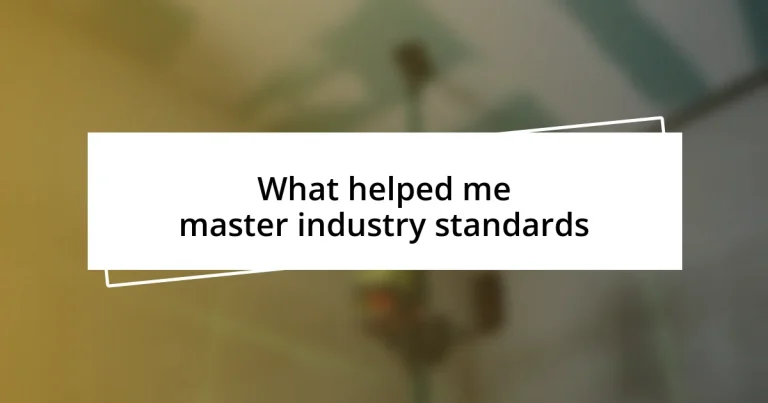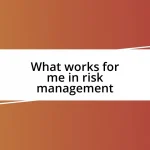Key takeaways not available due to an error.
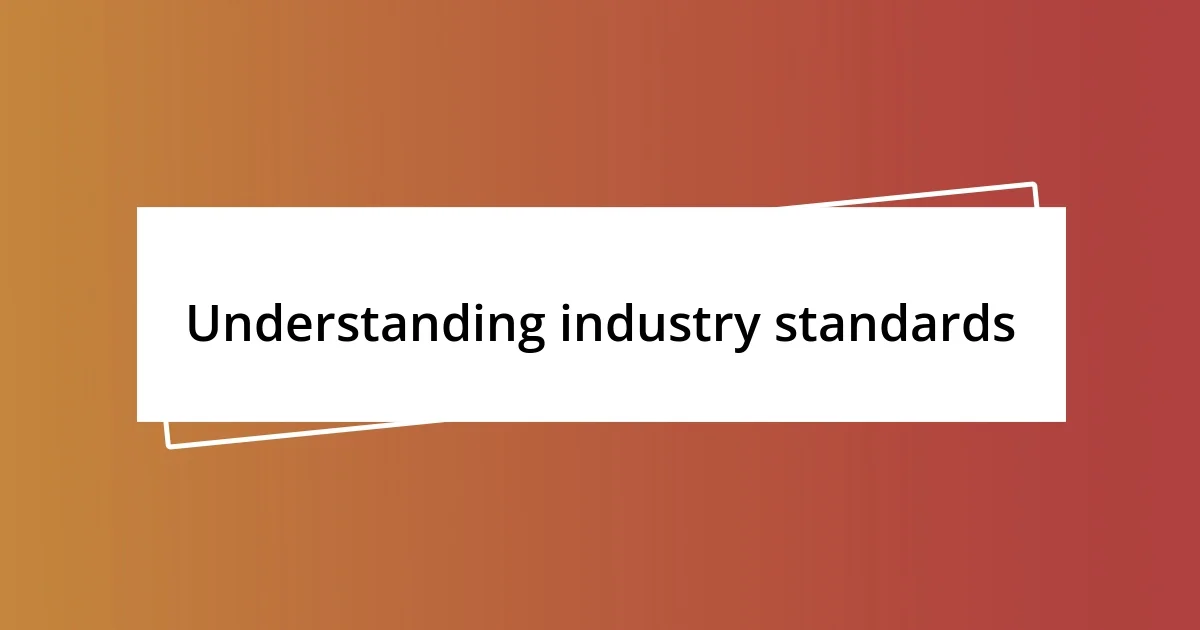
Understanding industry standards
Understanding industry standards is more than just a checklist; it’s about grasping the principles that guide best practices. When I first encountered these standards, I remember feeling overwhelmed. How could so many regulations and benchmarks apply to a space that felt so fluid and dynamic? I soon learned that these standards exist to create a foundation for quality and consistency, ensuring everyone is on the same page, ultimately benefiting clients and professionals alike.
Reflecting on my early days in the industry, I realized that these standards served as a kind of roadmap. They helped me navigate through complex scenarios, guiding my decisions and actions. A pivotal moment was when I faced a project that required adherence to certain safety regulations. It was daunting at first, but once I aligned my work with those standards, I found clarity and direction that I hadn’t anticipated. Isn’t it fascinating how something that seems constraining can actually liberate us by providing structure?
As I gained more experience, I began to appreciate the subtle nuances of industry standards. They’re not just numbers or rules; they tell a story of collective knowledge and practices honed over time. Each standard reflects the lessons learned from past challenges. Have you ever wondered how an industry evolves? Standards are often at the heart of that evolution, acting as pillars that support innovation while ensuring safety and quality.
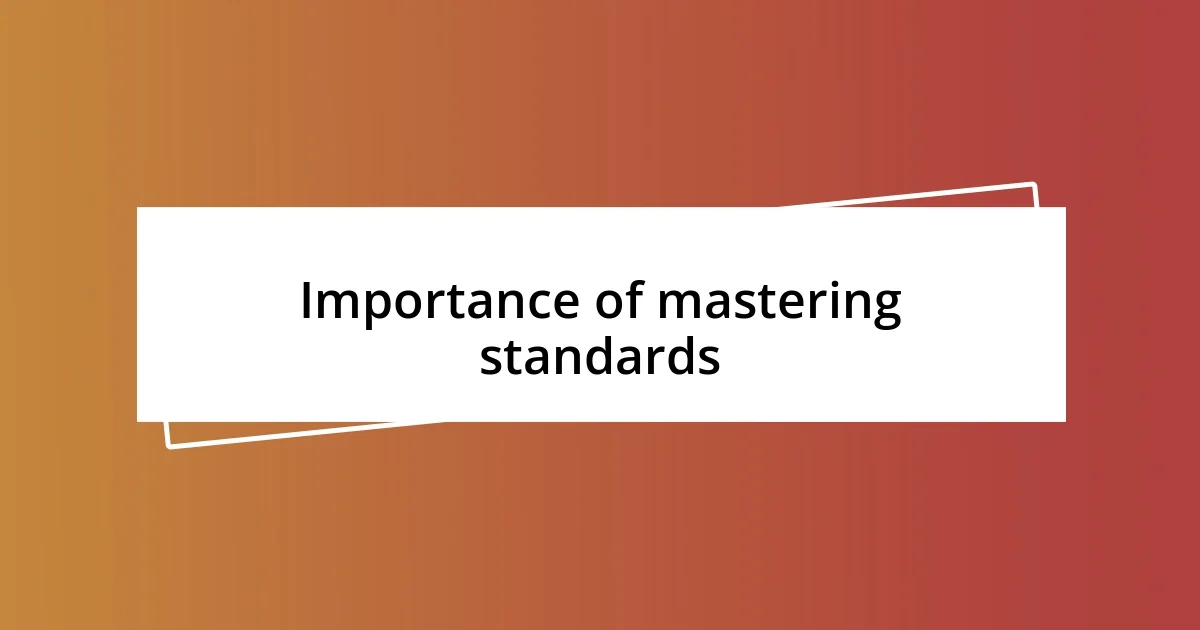
Importance of mastering standards
When I think about the importance of mastering industry standards, I realize it’s about more than just compliance; it’s about establishing trust. One time, I was working on a project with a new client who was understandably skeptical. But once I showcased my knowledge of the relevant standards, I saw their demeanor shift instantly. It’s a remarkable feeling when people view you as a reliable expert rather than just another vendor. I’ve learned that clients want reassurance, and mastery of standards provides that comfort.
- They create a common language among professionals, fostering collaboration.
- Understanding these standards helps mitigate risks associated with poor practices.
- Mastery ensures that you are prepared for unexpected challenges, turning potential obstacles into opportunities.
- Clients and stakeholders are more likely to invest in someone who demonstrates a strong grasp of industry norms.
- Lastly, staying informed on standards positions you as a leader in your field, opening doors for growth.
I’ve experienced the confidence that comes from knowing I’m adhering to best practices, and it’s a feeling I want to share with others.
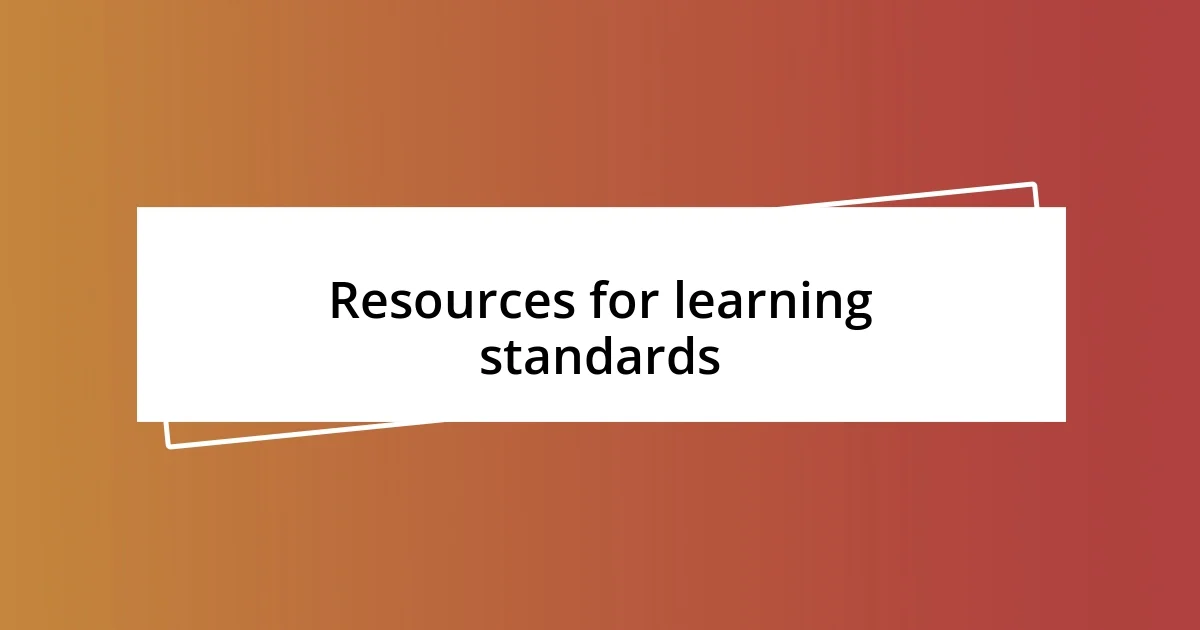
Resources for learning standards
Understanding where to find resources for learning industry standards is key to mastering them. I often turn to professional organizations, which offer a wealth of webinars, training programs, and certifications that provide structured learning. For instance, I once participated in a workshop hosted by a leading organization in my field, and it not only deepened my knowledge but also connected me with like-minded professionals.
Online platforms have become invaluable in my journey to grasp these standards fully. Websites dedicated to industry news frequently publish articles and case studies that help put theory into practice. I recall reading an insightful article about a recent regulatory change, which enabled me to adjust my practices ahead of time. This proactive approach has saved me from potential compliance headaches down the line.
I’ve also found mentorship to be an incredible resource. Having someone experienced in the industry guide you through standards can make a tremendous difference. I remember reaching out to a former colleague who was deeply versed in compliance. Their practical insights and advice felt like a shortcut through a maze of regulations, giving me a greater appreciation for the depth and value of these standards.
| Resource Type | Description |
|---|---|
| Professional Organizations | Provide workshops, training, and certifications. |
| Online Platforms | Publish articles and case studies relevant to current standards. |
| Mentorship | Experienced professionals offer personalized guidance. |

Techniques for practical application
The practical application of industry standards isn’t just theoretical; it requires hands-on techniques that make those standards come alive in your daily work. One method that has really resonated with me is creating a checklist based on specific standards relevant to my projects. I remember the first time I used such a checklist; it felt empowering to systematically ensure every requirement was met. Have you ever experienced that rush of confidence when you know you’re on track? It’s a simple yet effective way to turn abstract standards into concrete actions.
Another technique I’ve found incredibly useful is role-playing scenarios that involve decisions rooted in industry standards. In one instance, my team and I simulated a compliance challenge, which not only highlighted gaps in our understanding but also strengthened our ability to respond in real situations. It transformed what could have been a dry training session into an engaging, thought-provoking experience. How often do we put ourselves in those high-stress situations to prepare for unexpected challenges? This approach crystallized my knowledge and made it easier to apply standards under pressure.
Finally, documenting my experiences and thoughts regarding the application of these standards has been a game-changer. After I faced a particularly tricky compliance issue last year, I took the time to write about it. Reflecting on what worked and what didn’t not only clarified my thinking but also created a valuable resource I could return to later. Have you ever thought about keeping a journal or log for your professional challenges? It’s a practice that fosters continuous learning and reinforces accountability, allowing me to approach similar situations with newfound confidence and clarity.
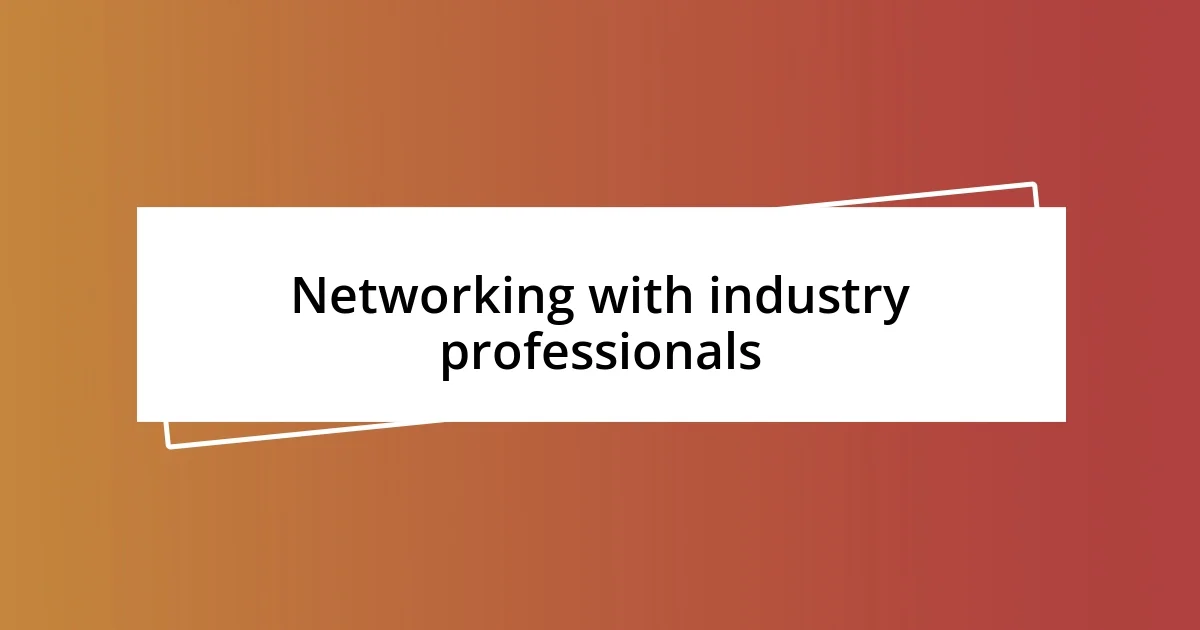
Networking with industry professionals
Building relationships with industry professionals has truly transformed my understanding of the standards we work with. I recall attending a conference where I struck up a conversation with a seasoned expert during lunch. The exchange was invigorating; their insights not only illuminated complex standards but also sparked ideas for my own projects. Have you ever had a casual conversation that unexpectedly shifted your perspective? It’s remarkable how networking can open up new avenues of thought.
One of my most rewarding experiences came when I joined a local professional group. Through monthly meetups, I connected with individuals who faced similar challenges in navigating industry standards. One of my peers shared their struggle with compliance documentation, and together, we brainstormed solutions that streamlined their processes. This collaboration left me feeling inspired and reminded me that we often grow the most from shared experiences and collective problem-solving. Have you felt that electric charge of working together towards a common goal?
I’ve also learned the importance of following up with new contacts. After exchanging contact information with a fellow attendee at a seminar, I sent a simple email thanking them for their insights. This small gesture blossomed into a mentoring relationship that has provided invaluable guidance. Their willingness to share their journey through the intricacies of compliance has been a genuine gift in my professional life. Don’t underestimate the power of a follow-up; it can turn a fleeting encounter into a lasting partnership.

Real life success stories
I remember when I first heard about a colleague who transformed their company’s approach to quality control by implementing a mentorship program. They paired junior employees with seasoned veterans, and the results were astonishing. Watching the newer team members develop their skills while navigating industry standards under the guidance of experienced mentors was incredible. Have you ever witnessed how the right mentorship can catalyze someone’s growth?
Another inspiring story comes from a friend who decided to take a leap of faith and launch a startup rooted in sustainability practices that adhered to strict industry standards. During their journey, they faced significant setbacks, but their commitment to learning and adapting allowed them to thrive. It was their determination and willingness to seek out feedback from industry veterans that made the difference. Have you found that your most impactful learning moments often come from overcoming adversity?
Lastly, there’s a story of a director in a tech firm who initiated an internal workshop series focused on understanding industry standards in-depth. Employees shared real-life cases, which fostered a culture of continuous improvement. Witnessing my colleagues grow through vibrant discussions and shared triumphs reminded me of the power of learning from each other. Isn’t it fascinating how collaborative environments can reshape our grasp of industry standards?
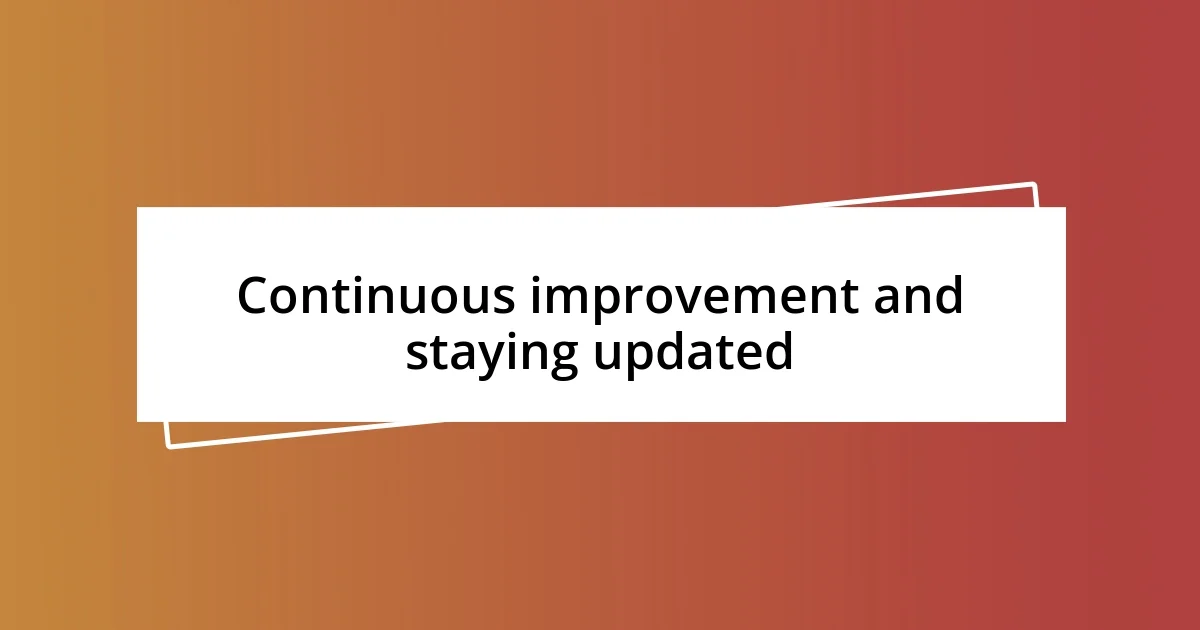
Continuous improvement and staying updated
Continuous improvement is a mindset that I’ve embraced wholeheartedly in my professional journey. I vividly recall a period when I dedicated an hour each week to studying recent industry publications and attending webinars. Those moments of investment opened my eyes to emerging standards and trends that I hadn’t previously considered. Have you ever felt that rush of excitement when encountering new ideas that challenge your current practices?
Staying updated isn’t just about information; it’s about actively seeking growth opportunities. One of my favorite experiences was when I took it upon myself to enroll in a certification course related to my field. It wasn’t just the knowledge gained, but the discussions with fellow participants that sparked remarkable insights. I often leave sessions buzzing with ideas, thinking about how I can implement these concepts in practical ways. How do you keep the flame of learning alive in your professional life?
Moreover, the process of continuous improvement has significantly influenced my approach to feedback. Once, after receiving constructive criticism on a project, I felt a mix of disappointment and challenge. Instead of retreating, I sought further clarification and guidance, which led to a breakthrough in my understanding of the standards involved. Have you experienced that transformative moment when feedback ignites a new understanding? Embracing feedback as a tool for growth has reshaped my perspective and pushed me closer to mastering industry standards.












